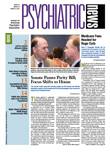What happens when childhood trauma and combat trauma collide in a soldier's psyche? The mental health fallout can be exponential, a new study suggests.
The study was headed by Capt. Oscar Cabrera, deputy commander of the U.S. Army Medical Research Unit-Europe. Results were published in the August American Journal of Preventive Medicine.
Past research has shown a dose-response relationship between childhood adversity and a plethora of negative outcomes in adulthood for both physical and mental health. Studies have also shown a strong link between combat and depression and between combat and posttraumatic stress disorder (PTSD), Cabrera and his colleagues noted. So they decided to study the extent to which depression and PTSD in soldiers might be linked to childhood adversity and to combat exposure.
They evaluated some 2,400 soldiers three months after returning from Iraq for adverse childhood experiences. The unfavorable childhood experiences included exposure to a mentally ill person in the home, exposure to an alcoholic adult in the home, sexual abuse, physical abuse, psychological abuse, and violence directed against one's mother. Over half the soldiers reported at least one adverse childhood experience, and over one-fourth reported two or more.
The researchers used the Patient Health Questionnaire and the Post-Traumatic Stress Disorder Checklist to evaluate the soldiers for depression and PTSD. They found that 8 percent of the soldiers met criteria for depression, and about 25 percent did so for PTSD.
The researchers then evaluated whether the degree of childhood adversity the soldiers had experienced could significantly predict the presence of depression or PTSD. They found that the likelihood of screening positive for depression or PTSD was in fact significantly higher for soldiers reporting exposure to two or more categories of childhood adversity.
They also found that combat exposure could significantly predict depression or PTSD in the soldiers studied.
When the researchers looked at the interaction among childhood adversity, combat, and the two psychiatric disorders, they found that exposure to childhood adversity appeared to be not just a significant predictor of depression and PTSD in these soldiers, but was even “a significant predictor of depression and posttraumatic stress symptoms above and beyond the role of combat exposure.”
These results have practical implications for the treatment of soldiers returning from war, the researchers believe. For example, evaluation of childhood trauma in soldiers might be worthwhile “as this factor may contribute to the intractability of symptoms and/or the length of treatment.”
The study was funded by the U.S. Army Medical Research and Materiel Command.
“Childhood Adversity and Combat as Predictors of Depression and Post-Traumatic Stress in Deployed Troops” is posted at<www.ajpm-online.net> under “Free access articles.” ▪
